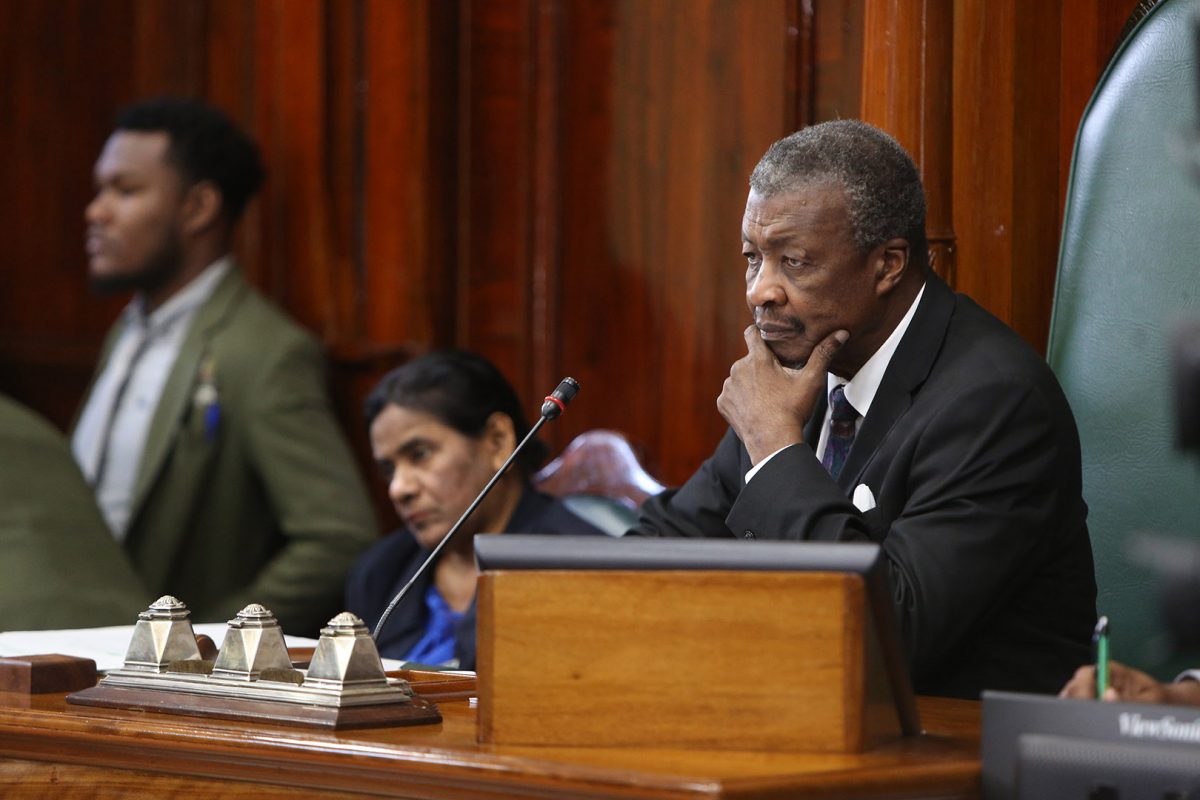Speaker of the National Assembly Dr Barton Scotland yesterday told reporters that the National Assembly “continues” and will conclude its two-month recess on October 10th.
He, however, noted that as far as he is aware there is no sitting scheduled for that date.
Scotland was at the time responding to questions posed by Stabroek News on the current status of the National Assembly at the handing over of the 2018 Auditor General’s Report.
There have been questions about the status of the National Assembly as a result of the deadline for the holding of elections having passed in wake of the successful passage of a no-confidence motion against the government, which was upheld by the Caribbean Court of Justice (CCJ).
Appeals to the CCJ had put the Article 106 three-month timetable on hold but the CCJ in delivering its consequential orders on July 12 had said that a new three-month period had begun on June 18th, when it had ruled on the validity of the vote on the motion. This period expired on September 18 without the government securing an extension and observers say that it is debatable whether an extension can now still be granted by Parliament as its tenure would’ve been affected by the same timeline.
On September 25th, President David Granger announced that March 2nd 2020 is the earliest date for general elections based on a timeline provided by the Guyana Elections Commission (GECOM).
At the time Granger said that Parliament would meet on October 10th for the purpose of requesting an extension of the three-month period for the holding of general elections in the aftermath of a successful motion of no-confidence. Such an extension would require the support of the opposition as two-thirds of the votes of the elected members of the Assembly would be needed. Following a declaration from Opposition Leader Bharrat Jagdeo that the PPP/C would not support an extension, Granger stated that elections would be held on March 2nd, whether or not the opposition returns to the Assembly.
He is, however, still to issue a proclamation which would dissolve parliament.
Last Friday People’s National Congress Reform (PNCR) executive member Aubrey Norton at the party’s weekly press conference said that the president can announce a date but he cannot at this stage dissolve Parliament since the law states at Article 61 that, “An election of members of the National Assembly under article 60 (2) shall be held on such day within three months after every dissolution of Parliament as the President shall appoint by Proclamation.”
He added that to dissolve Parliament is to automatically state that you are heading to the polls in three months which would violate GECOM’s timeline.
“Parliament will be dissolved at the right time,” he stressed.
One day after Norton’s statement the Organisation of American States (OAS) said it was looking forward to a proclamation of March 2nd as the date for long-awaited general elections here and urged an end to the political uncertainty that has gripped Guyana.
The US, the UK, the European Union and the Commonwealth have also raised concerns about the Guyana Government functioning unconstitutionally.
Specifically the US, UK and the EU have said that development aid to Guyana will be affected by virtue of the state of unconstitutionality.
Automatically dissolved
Former two-term Speaker of the National Assembly Ralph Ramkarran has said that Parliament should be
considered automatically dissolved given the constitutionally mandated period for general elections.
In his column in the September 15 Sunday Stabroek Ramkarran pointed out that the CCJ had ruled that general elections should have already been held by March 21st this year. Abidance by that date would have seen the 11th parliament being dissolved sometime before. This did not occur as President David Granger’s government challenged the validity of the December 21, 2018 motion of no confidence.
However, on June 18 this year, the CCJ upheld the motion of no confidence and said that article 106 (6) and (7) were in effect as of the date of the judgment meaning that elections should have been held by September 18 and parliament dissolved before that date.
He noted that the dissolution of Guyana’s Parliament occurs in two ways – by proclamation by the President or automatically, five years from the date when the Assembly first meets after any dissolution.
“The President’s discretion is absolute only in one respect, that is, if he wishes to call elections before the time is due. The President has no discretion where elections are lawfully due. He/She would normally dissolve the Parliament when elections are lawfully due. But if he/she does not, the Assembly would automatically dissolve at the time set out above”, Ramkarran argued.
He noted that Article 106 of the constitution, which provides for elections in three months (or longer if Parliament extends the time) after a no confidence motion, does not make allowance for a dissolution.
“But by any reasoning or analysis, the Parliament ought to have been dissolved by now in preparation for elections by September 18. Not having been formally dissolved by a proclamation issued by the President, the implied power exists in the Constitution for its automatic dissolution. Since the Parliament is now without any legal status, it is for our Speaker to apply the `procedural creativity’ (recently) referred to by the Speaker of the (UK) House of Commons (John Bercow) and declare that having regard to all the circumstances, and that since elections ought to have been held by now, or are soon to be held, the continued existence of Parliament is a legal anomaly which ought not to continue. It also perpetuates a fraud against the Guyanese people by holding back elections. The Speaker should declare that Parliament cannot be convened on October 10, when its recess ends, as it is not in lawful existence”, Ramkarran stated.






